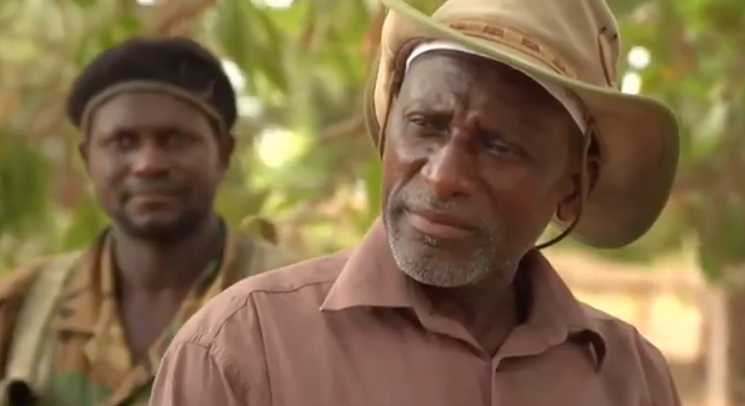Salif Will Follow Cesar’s Footsteps to Canossa

Cesar Atoute Badiate has come to Canossa. It is just a matter of time, but Salif Sadio will also come to Canossa. Since the offensive launched by Colonel Kandé to clean up Southern Casamance in January 2021, what was left of the Southern Front really only had the choice of surrendering and the State, thanks to President Embalo, intervened at the right time to offer them an honorable way out with the Bissau agreements, applying a Churchillian wisdom that says that « magnanimity towards a defeated adversary is not only moral, but it is a good investment for the future ». And the future here is lasting peace, because the MFDC rebels cannot do what the Olp fighters did in Lebanon, who were put on boats to be exfiltrated to Tunis.
As said before, Salif Sadio will also come to Canossa. He would have done so long ago if the army’s pressure had been stronger. « Conversion or exile » was the choice offered to Muslims and Jews after the Catholic reconquest in Spain. Today, it is the choice offered to Salif Sadio. Conversion to peace or packing his suitcase. And even the choice of the suitcase is a hypothetical one with democratic and Senegal-friendly powers in Banjul and Bissau. History shows that a rebellion will only negotiate seriously when and if it is convinced that their military options are doomed. And today, all wings of the MFDC, both political and military, are convinced of this. Before reaching this point, negotiation is nothing more than the continuation of war by other means. And the MFDC has often used and abused this ruse as a strategy to wage war.
These agreements are likely legitimate because we can finally believe in the sincerity of the MFDC, which no longer has leverage with the sword of Damocles hanging over its head. So, it is time to offer an honorable way out to Salif Sadio by recognizing that his struggle has not been in vain, for having allowed a new Senegalese social contract, which binds together a plural but indivisible society and which has allowed our territorial Administration to go from « Faidherbe to Claude Levis Strauss ». This honorable way out for Mr. Salif Sadio is a good investment for the future, as was the case with Jefferson Davis, the leader of the secessionist states of the Southern United States, who died quietly in his bed more than 20 years after the secession war, thanks to the magnanimity of Lincoln, who understood that it was essential for reconciliation and reconstruction.
With peace on the horizon, we will have to think about reintegrating the former armed militants. Obviously, Senegal will not make the mistake of integrating them into the Defense and Security Forces. This mistake was fatal to the armies of Mali and Côte d’Ivoire. On the other hand, they will be very useful for their region and their country, in reforestation and demining. These agreements are an excellent pretext to pay homage to the two pillars and servants of the Republic, namely the soldier and the teacher. In the midst of turmoil, these two pillars have always been the vanguard of the Republic. There was a time when, in the remotest corners of Casamance, the presence of the State and the Republic was reduced to the military barracks and the school, to the soldier and the teacher, with instances where the soldier became the teacher just to keep the school open. Despite the borders inherited from colonization in the OAU/AU charter, Eritrea became independent after winning its war, and South Sudan did as well, especially for having won the battle of public opinion against Sudan. The MFDC has lost the two essential battles: the military battle and the battle of international opinion. Senegal owes its territorial integrity today to its army, but also to the national political consensus on the issue, despite the changes in administrations. The MFDC was weakened over time by the all-military approach of Abdou Diouf, division within their ranks caused by Abdoulaye Wade’s briefcases, and also weakened by the accelerated opening up of the area by Macky Sall, who had to overcome Jammeh’s obstructionism, thus speeding up the construction of the Farafegny bridge.
The fall of Jammeh was decisive in the agony of the MFDC, which lost its support and rear base. Despite the agreements, there may be residual violence, but the return of peace has become irreversible. A long cycle of conflict in the South, which began with the coup d’état of Kukoi Samba Sagna in July 1981, ended in Bissau last week, with episodes such as Operation Gabou or Micega. The Army has been up to the task for every single time they have been called upon, a cycle which is now coming to an end. It must now concentrate on the conflict to the East, with the Senegal River as a front line, with jihadism that started in Kidal and is now in Kayes. The greatest lesson of the conflicts in the South is that a country must never outsource its security. That is why we all owe a great debt of gratitude to the Army, which paid a high price to avoid the partition of our nation.
By Yoro DIA / yoro.dia@lequotidien.sn

